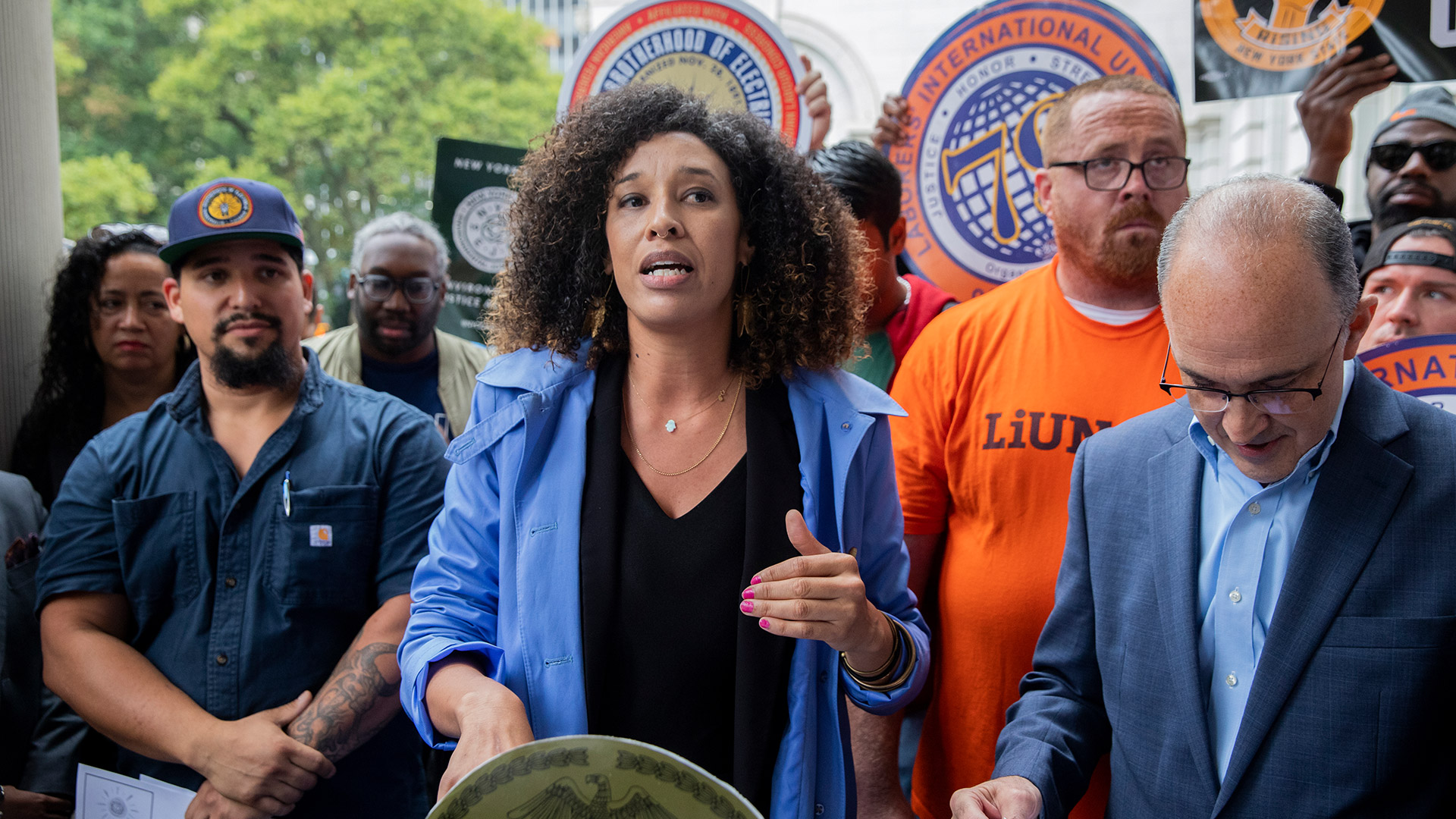Newsletter #86 | November 2024 |
|
LNS Welcomes New Communications director |
|
|
Virginia Rodino |
|
LNS is proud to introduce our new Communications Director, Virginia Rodino. Virginia’s professional career has focused on communications strategy for labor, non-profit, and activist organizations. She has decades of experience tying together coalition building, advocacy, research, policy, and communications strategy to build grassroots campaings. She has worked at the Service Employees International Union as a senior communications strategist, served as executive director for the Coalition of Labor Union Women, AFL-CIO, and is the president of the Maryland chapter of the Asian Pacific American Labor Alliance. Her PhD dissertation explored the communications strategies of the global justice movement. Virginia says, “During my past nearly 30 years of professional social justice strategy work, I’ve prioritized lifting up the voices of the most marginalized communities to further social and economic justice and am honored to now be working at the intersection of labor and climate justice.” |
Letter from the Editor
|
|
|
Editor Jeremy Brecher, |
|
Workers organize to protect themselves from inadequate pay, overwork, insecurity, and threats to their health and safety. And now there is another threat to workers’ wellbeing: climate change. And workers are organizing to fight it.
The threat becomes more visible every day. You can see it in the devastation in Appalachia and the South from hurricanes Helene and Milton. Tens of thousands lost their jobs and found their homes and communities destroyed. And as former Deputy Assistant Secretary of Labor Jordan Barab points out below, while anyone can be at risk from climate-related events, “workers bear an added element of risk because of the jobs they do and their lack of control in their workplaces.” As waters rose during hurricane Helene, workers in at least one plant were actually forbidden to leave their jobs – and three of them died as a result. Devastation by storms, floods, fires, droughts, heatwaves, and other effects of climate change is not a short-term problem. In New Orleans in the ten months following hurricane Katrina 95,000 individuals lost their jobs. Efforts to gentrify neighborhoods in order to promote a new post-Katrina economy left the city’s lower-income residents without the means to return. In 2020 New Orleans’ population remained 20 percent below its level in 2000. According to hurricane scientist Dr Jeff Masters, the U.S. had a record eight Category 4 or Category 5 Atlantic hurricanes in the past eight years, as many as occurred in the prior 57 years.
Photo Credit: Paschal Roth Public Affairs Workers’ self-organization to protect our climate and our jobs is what the Labor Network for Sustainability is all about. |
IN THIS ISSUE
|
|
Hurricanes Fed by Global Warming Ravage Workers and Communities Climate Change: In Case You Haven’t Heard... |
 |
|
Hurricanes Fed by Global Warming Ravage Workers and Communities |
|
|
Back-to-back hurricanes Helene and Milton have devastated much of Appalachia and the South. In a statement following Hurricane Helene, the Labor Network for Sustainability called it “A Wake-up Call for Social Justice.” It said these tragedies of death and destruction “are not natural.”
The statement pointed to major culprits in the climate crisis. It noted a study by the non-profit Oxfam revealing that 125 billionaires are responsible for more than twice the carbon emissions of the poorest half of humanity. And it cited a study released during Hurricane Helene which found that 21leading US private equity firms are responsible for 1.17 gigatons of climate-destroying greenhouse gas emissions —more than three times as much as from the energy used to power every home in the United States.
Union members in the ILA, IAM and APWU are fighting for a Just Recovery for all of us – and we must stand with them. Now more than ever we need to build a mass movement together in order to win a just recovery and just transition that serves the needs of people and our planet, not more profit for corporations and billionaires.
To make donations toward relief efforts, please find a comprehensive list of resources here, including food drives, shelter, and FEMA applications. Donations can also be made to Southeast Climate Energy Network. |
|
|
How Climate Change Threatens Workers |
|
Photo Credit: MedAct |
|
|
|
A recent article in the workplace safety newsletter Confined Space analyzes recent deaths at Impact Plastics to show why workers are particularly vulnerable to the effects of climate change. The author is Jordan Barab, who was Deputy Assistant Secretary of Labor from 2009 to 2017 and previously worked for AFSCME and the AFL-CIO.
According to Barab, while anyone can be at risk from adverse weather events, “workers bear an added element of risk because of the jobs they do and their lack of control in their workplaces.” Worker risk is in part a function of workers’ power in the workplace — or lack thereof. “Where they work, the conditions they work under and their ability to protect themselves against obvious threats make workers more vulnerable than average citizens to the risks posed by climate change.”
Barab gives as a case in point Impact Plastics in Erwin, Tennessee, where three workers died in Hurricane Helene. Jacob Ingram, a mold changer at the company, told the Knoxville News Sentinel that as the flooding started, managers instructed employees to move their cars away from the rising water – but would not let them leave.
Barab comments, “if they’re not allowed leave work in the face of an approaching tornado or floods without fear of being fired — what we’re seeing is basic job blackmail: your job or your life.” |
|
|
|
Join “the Green New Deal from Below” book launch |
|
|
|
The Labor Network for Sustainability is pleased to announce the publication of The Green New Deal from Below: How Ordinary People Are Building a Just and Climate-safe Economy by LNS Co-Founder Jeremy Brecher.
The Labor Network for Sustainability is taking the opportunity to launch the book, as well as the organizing models it provides, in a live webinar event scheduled for Wednesday, November 20th at 7:30pm ET. Register for the event by clicking here.
The core principle of the Green New Deal recognizes climate protection as the basis for realizing full employment and social justice. While the struggle to embody it in national legislation is ongoing, there is a wave of initiatives from community groups, unions, city and state governments, tribes, and other non-federal actors designed to contribute to the climate protection and social justice goals of the Green New Deal. The Green New Deal from Below recounts such Green New Deal from Below initiatives in more than 40 states.
John Nichols, The Nation’s national affairs correspondent, says:
Varshini Prakash, co-founder of the Sunrise Movement, says,
|
|
|
|
If California Politicians Won’t Support Climate Projects, Can the People Make Them Do It Anyway? |
|
|
By LNS California Organizer Veronica Wilson
On election day, in addition to selecting their choice for President of the United States, California voters will decide whether or not to fund climate projects. Measure 4 is a $10 billion bond to spend on clean drinking water, protections from floods, droughts and extreme heat, ocean protections, parks, and clean energy projects, among other initiatives. It prioritizes low-income communities and those living on the frontlines of climate change impacts.
Measure 4 allocates $3.8 billion to water projects — half to improve water quality, the other half to protect the state from disasters like floods and droughts and for restoring rivers and lakes. The rest is $1.95 billion for wildfire and extreme heat projects; $1.9 billion for natural lands, parks, and wildlife projects; $1.2 billion for coastal and ocean protection; $850 billion for clean energy projects; and $300 million for agricultural projects.
California has had a rough budget year in 2024. State budget cuts for affordable housing and resilience centers spurred environmental groups to turn to the public to weigh in. In addition to the dozens of environmental groups, the California State Federation of Labor, California Fire Fighters, California Federation of Teachers, and California Nurses have endorsed Measure 4. |
|
|
|
Heat Kills; Heat Standards Will Save Workers’ Lives |
|
|
By LNS California Organizer Veronica Wilson
Heat can be deadly for workers whether they are working outdoors or indoors. According to National Council for Safety and Health, COSH, “Extreme heat causes as many as 2,000 worker fatalities in the U.S. each year, and up to 170,000 workers are injured in heat stress-related accidents annually.”
Earlier this year, the Biden Administration directed the Occupational Safety and Health Administration (OSHA) and the Department of Labor to propose a new federal Heat Injury and Illness rule. The worker health and safety group COSH, in partnership with WorkSafe, the Center for Popular Democracy, the New Orleans Workers Center for Racial Justice, and other organizations, is leading the "Fired Up for Heat Justice" campaign which is hosting teach-ins and town halls. The public comment period on the proposed heat rule is open until December 30, 2024.
Support OSHA’s heat standard here. Here are Workers for Heat Justice resources. Aquí están los recursos de ¡Encendidos! Trabajadores por la Justicia de Calor.
|
|
|
|
Climate Change: In Case You Haven’t Heard... |
|
|
The “2024 State of the Climate Report” just issued by a team of climate scientists finds that “We are on the brink of an irreversible climate disaster.” This is “a global emergency” in which “much of the very fabric of life on Earth is imperiled.”
The report, published in BioScience, found that fossil fuel emissions have increased to an all-time high, the 3 hottest days ever occurred in July of 2024, and current policies are on track for approximately 2.7 degrees Celsius (°C) peak warming by 2100.
Last year, we witnessed record-breaking sea surface temperatures, the hottest Northern Hemisphere extratropical summer in 2000 years, and the breaking of many other climate records. Moreover, we will see much more extreme weather in the coming years. As of 2022, global fossil fuel combustion and industrial processes account for approximately 90% of these emissions, whereas land-use change, primarily deforestation, accounts for approximately 10%.
Escalating climate impacts are bringing forth “unprecedented disasters around the world” and “human and nonhuman suffering.” We find ourselves amid “an abrupt climate upheaval, a dire situation never before encountered in the annals of human existence.” |
|
|
|
Solar Jobs Market Heating Up |
|
|
The recently released 2023 Solar Jobs Census published by the independent nonprofit organization Interstate Renewable Energy Council (IREC), found that full-time jobs in the US solar industry grew nearly 6% in 2023. Solar jobs increased in 47 states. More people are working in the solar industry than ever before. In the clean storage industry, which mainly includes battery storage firms, there were an additional 89,592 workers, for a total of about 454,000 people who worked in either solar energy or storage in 2023.
|
|
|
|
New York State Bill to Put Solar on Public Buildings |
|
Councilmember Sandy Nurse (podium) at climate rally on September 26 | Photo Credit: New York City Council |
|
A recent law passed by the New York City Council with a supermajority of votes will put unionized workers to work installing solar panels on city buildings.
The bill was sponsored by City Councilmember Sandy Nurse with 46 co-sponsors. According to an article in Amsterdam News, the bill requires that the Department of Citywide Administrative Services (DCAS) install at least 150 megawatts of solar panel roof systems on city-owned buildings by 2035. DCAS will be required to report eligible and ineligible rooftops, and identify city-owned properties that already have solar panels installed. Funding for the installations will come from city capital and expense funds. According to Councilmember Nurse,
Nurse’s office said unions have negotiated a project labor agreement that will ensure union labor is used for the installations. Vincent Alvarez, president of the New York City Central Labor Council, AFL-CIO, and director of the union coalition Climate Jobs New York which campaigned for the law, said that union members have been working hard to see this bill pass, and are very thankful for the City Council’s support. “It’s particularly gratifying to see how our union workers, environmental advocates, and elected officials can come together to make our city a leader on climate action and creating good union jobs,” Alvarez said.
For full Amsterdam News article: Amsterdam News. |
|
|
Big Businesses Promoting Union Busting, Climate Destruction |
|
|
A report by the global labor federation the International Trade Union Confederation (ITUC) finds that the large corporations Amazon, Tesla, Meta, ExxonMobil, Blackstone, Vanguard, and Glencore are undermining democracy across the world by financially backing far-right political movements, funding and exacerbating the climate crisis, and violating trade union rights and human rights. The ITUC represents 191milllion workers in 169 nations.
The report says that Amazon, for example, “has become notorious for its union busting and low wages on multiple continents, monopoly in e-commerce, egregious carbon emissions through its AWS data centers, corporate tax evasion, and lobbying at national and international level.” The report provides detailed information on Amazon, Tesla, Meta, ExxonMobil, Blackstone, Vanguard, and Glencore.
Todd Brogan, director of campaigns and organizing at the ITUC, says,
This is about power, who has it, and who sets the agenda. We know as trade unionists that unless we’re organized, the boss sets the agenda in the workplace, and we know as citizens in our countries that unless we’re organized and demanding responsive governments that actually meet the needs of people, it’s corporate power that’s going to set the agenda.
The Guardian: Amazon, Tesla and Meta among world’s top companies undermining democracy – report
ITUC page on “Corporate Underminers of Democracy” |
|
|
|
Southern California Refinery to Close |
|
Photo credit: Brittany Murray, Press-Telegram/SCNG |
|
By LNS California Organizer Veronica Wilson
On October 16th, news broke that Phillips 66 will shut down its Los Angeles refinery in the fourth quarter of 2025. The company gave notice of plans to close the refinery that has roughly 600 employees and a few hundred more contractors in two facilities linked by pipeline located five miles apart in Carson and Wilmington, California.
Built more than a hundred years ago, the refinery distills crude oil and produces a high percentage of transportation fuels. Operators are at the refinery day and night, rain or shine to make sure fuel is processed safely. Refinery closures are not new in California. The number of refineries in the state has been on the decline since the 1990s, from more than 30 to less than 10 today. Still, the timing is unpredictable and losing employment can be life threatening. Emotional and financial toll on workers and impact on local economies and whole communities can be devastating.
In 2021, unions representing workers in oil, the public sector, health care and manufacturing in the state came together in solidarity to get behind a plan for California to transition to clean energy. Recommendations were largely based on economic analysis pointing to solutions like wage insurance, health care and retraining. These recommendations were echoed in a survey of workers who were laid off when the Marathon refinery in Martinez, California shuttered suddenly at the outset of the pandemic.
Unions have been advocating for direct financial support and skills verification at the top of the list of supports needed as part of a Workers Climate Bill of Rights. The question now is will this real-time transition moment inspire action to support workers and communities? And if not, what will it take? |
|
|
Join the Movement! Sign Up Here to receive our monthly newsletter and other important updates. |
|
Making a Living on a Living Planet is published by the Labor Network for Sustainability. Copyright 2024. Labor Network for Sustainability. All rights reserved. |
|
|












